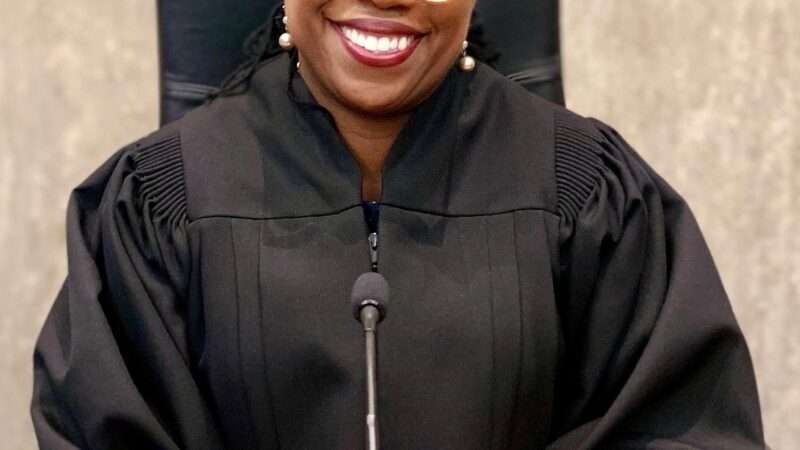
One of the most high profile cases on the Supreme Court's docket for next term is Students for Fair Admissions v. President & Fellows of Harvard College, a challenge to Harvard University's use of race in undergraduate admissions. The petitioners claim that Harvard is discriminating against Asian applicants and are asking the Court to hold that federal law prohibits any use of race in college admissions, while Harvard maintains its admissions practices are consistent with the Supreme Court's decision in Grutter v. Bollinger, and that this precedent should be upheld.
Assuming Judge Ketanji Brown Jackson is confirmed to the Supreme Court this spring, one of her first decisions will be whether to recuse in this case. Since 2016, Judge Jackson has been a member of Harvard's Board of Overseers, which (according to Harvard's website) is "one of Harvard's two governing boards" and "plays an integral role in the governance of the University" by fulfilling oversight and advisory functions. Judge Jackson's term on the Board ends this year, but she has been a member throughout the pendency of this litigation.
A Washington Post story delves into the question whether this relationship means that a Justice Jackson should recuse from the Students for Fair Admissions case. As the article notes, the justices are not bound by the code of judicial conduct, but generally follow the same standard in determining whether to recuse from a case. The qualification "generally" is important here, as justices are somewhat less likely to recuse in cases than their lower court colleagues because, unlike on lower courts (and unlike some state supreme courts), there is no way to substitute for a recused justice. Thus, a recusal has the same practical effect as a vote against the petitioner.
From the Post article:
Jackson's affiliation with Harvard is more current. She has served as a member of the oversight board, which provides "counsel to the University's leadership on priorities, plans, and strategic initiatives," since 2016. Herterm ends May 26; the courtwill hear the affirmative action challenges to policies at Harvard and the University of North Carolina in the term that begins in October.
"Six years on the Board is a long time, so, to quote the federal recusal law, her 'impartiality' in the case — that is, in favor of Harvard, given her ties to the Board — 'might reasonably be questioned' here, meaning disqualification is required," according to Gabe Roth, executive director of Fix the Court, a nonpartisan group that advocates for reforms. . . .
A key question in assessing whether Jackson should participate in the case is whether she played any role in the formation of the admissions policy being challenged, according to New York University law professor Stephen Gillers.
The board Jackson sits on was named in the original lawsuit in 2014 but dismissed as a party the next year, before Jackson was elected. It is separate from the smaller Harvard Corporation board, which has fiduciary responsibility.
As the Post story notes, Judge Jackson appears to have been fairly quick to recuse in cases where there was an apparent or potential conflict of interest, including some that involved Harvard.
Among the more than 2,000 pages Jackson submitted to the Senate Judiciary Committee in advance of her confirmation hearings is a list of the dozen cases over eight years in which she took the initiative to recuse. . . .
In a separate pair of cases, she recused because of her role on the Harvard board even though the university itself was not a party in the lawsuits. She declined in 2016 to get involved in a challenge to the Department of Education's sexual assault guidelines for colleges and universities because the board she was serving on "was evaluating its own potential response to those guidelines." Two years later, she removed herself from resolving a lawsuit filed by a Harvard research librarian against the Environmental Protection Agency after the government failed to respond to a public records request.
In both instances, Jackson wrote in her Senate questionnaire, "I determined that my impartiality might reasonably be questioned and that this issue was incurable."
If Judge Jackson is inclined to apply this same cautious approach as a Supreme Court justice, that would suggest she will recuse. But will it matter?
A potential recusal in the Harvard case would seem like a big deal, but it is not clear that it would affect the outcome. Harvard prevailed below, so it will take the votes of at least five justices for the petitioners, Students for Fair Admissions, to prevail. If there are not five votes for reversal, Harvard will be able to maintain its current policies and the Grutter precedent will stand, as the lower court's opinion would be affirmed without the issuance of a precedential opinion in the case of a tie vote. (Indeed, standard court practice is for there to be no opinion at all in such cases.)
Under the assumption that a Justice Jackson is likely to join the other liberal justices in rejecting the petitioners' claims, her recusal would not make it any easier for the petitioners to prevail. As a legal matter, a 5-3 decision holds the same force as a 5-4 decision. A recusal would, however, make it less likely that the Court issues an opinion reaffirming or expounding upon Grutter. For while it would only take four votes to prevent reversal of the lower court opinion, it would take five for the Court to issue a precedential opinion upholding Harvard's current admissions practices.
Whether it will matter or not, this is a question certain to come up in the Senate Judiciary Committee's confirmation hearings, and it will be interesting to see whether Judge Jackson commits to handling the recusal question in this case in any particular way.
The post Should Ketanji Brown Jackson Recuse in Harvard Admissions Case? appeared first on Reason.com.

.jpg?w=600)





